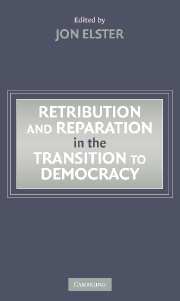
-
Select format
-
- Publisher:
- Cambridge University Press
- Publication date:
- 03 December 2009
- 08 May 2006
- ISBN:
- 9780511584343
- 9780521829731
- Dimensions:
- (234 x 156 mm)
- Weight & Pages:
- 0.67kg, 352 Pages
- Dimensions:
- Weight & Pages:
You may already have access via personal or institutional login
Book description
The contributions in this volume offer a comprehensive analysis of transitional justice from 1945 to the present. They focus on retribution against the leaders and agents of the autocratic regime preceding the democratic transition, and on reparation to its victims. Part I contains general theoretical discussions of retribution and reparation. The essays in Part II survey transitional justice in the wake of World War II, covering Austria, Belgium, Denmark, France, Germany, Hungary, the Netherlands, and Norway. In Part III, the contributors discuss more recent transitions in Argentina, Chile, Eastern Europe, the former German Democratic Republic, and South Africa, including a chapter on the reparation of injustice in some of these transitions. The editor provides a general introduction, brief introductions to each part, and a conclusion that looks beyond regime transitions to broader issues of rectifying historical injustice.
Reviews
"How did, and how should, emerging democracies deal with members and supporters of fallen autocratic or occupation regimes? By fusing analytical approaches with historical perspectives, this fascinating and eminently readable volume addresses an enduring political question in a refreshing way, at once normative, theoretical, and empirical. A must-read."
-Stathis N. Kalyvas, Yale University
"This is a timely and important collection of rigorously argued essays that bring a welcome historical and comparative frame to the study of transitional justice in new democracies. Their nuanced considerations of the moral complexities in intergenerational claims for restitution and rich analyses of how emotions, intentions and beliefs shape trials and sanctions push our understanding of transnational justice to new levels."
-Mark Philip Bradley, Northwestern University
"The most searching and illuminating book available on the promises and disappointments of transitional justice. Elster's introduction and concluding chapters are analytical masterpieces and almost every chapter is a treasure house of information and insight."
-Stephen Holmes, NYU School of Law
"This is a highly enjoyable, analytically rigorous and historically rich collection of essays on a fascinating, timely, and consequential topic. It is an important contribution to the already substantial and growing literature on transitional justice...The chapters in this volume engage the reader in a continuous dialogue between theory and concrete examples, back and forth."
-Julio Rios-Figueroa, NYU School of Law, The Law and Politics Book Review
Contents
Metrics
Altmetric attention score
Full text views
Full text views help Loading metrics...
Loading metrics...
* Views captured on Cambridge Core between #date#. This data will be updated every 24 hours.
Usage data cannot currently be displayed.
Accessibility standard: Unknown
Why this information is here
This section outlines the accessibility features of this content - including support for screen readers, full keyboard navigation and high-contrast display options. This may not be relevant for you.
Accessibility Information
Accessibility compliance for the PDF of this book is currently unknown and may be updated in the future.


